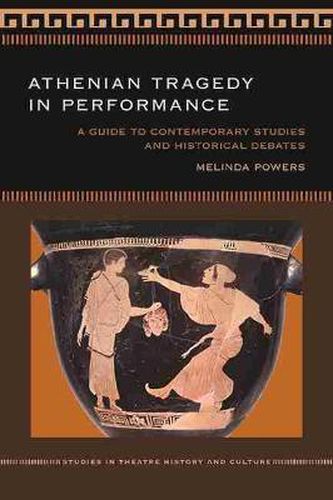Readings Newsletter
Become a Readings Member to make your shopping experience even easier.
Sign in or sign up for free!
You’re not far away from qualifying for FREE standard shipping within Australia
You’ve qualified for FREE standard shipping within Australia
The cart is loading…






Foregrounding critical questions about the tension between the study of drama as literature versus the study of performance, Melinda Powers investigates the methodological problems that arise in some of the latest research on ancient Greek theatre. She examines key issues and debates about the fifth-century theatrical space, audience, chorus, performance style, costuming, properties, gesture, and mask, but instead of presenting a new argument on these topics, Powers aims to understand her subject better by exploring the shared historical problems that all scholars confront as they interpret and explain Athenian tragedy.
A case study of Euripides’s Bacchae, which provides more information about performance than any other extant tragedy, demonstrates possible methods for reconstructing the play’s historical performance and also the inevitable challenges inherent in that task, from the limited sources and the difficulty of interpreting visual material, to the risks of conflating actor with character and extrapolating backward from contemporary theatrical experience.
As an inquiry into the study of theatre and performance, an introduction to historical writing, a reference for further reading, and a clarification of several general misconceptions about Athenian tragedy and its performance, this historiographical analysis will be useful to specialists, practitioners, and students alike.
$9.00 standard shipping within Australia
FREE standard shipping within Australia for orders over $100.00
Express & International shipping calculated at checkout
Foregrounding critical questions about the tension between the study of drama as literature versus the study of performance, Melinda Powers investigates the methodological problems that arise in some of the latest research on ancient Greek theatre. She examines key issues and debates about the fifth-century theatrical space, audience, chorus, performance style, costuming, properties, gesture, and mask, but instead of presenting a new argument on these topics, Powers aims to understand her subject better by exploring the shared historical problems that all scholars confront as they interpret and explain Athenian tragedy.
A case study of Euripides’s Bacchae, which provides more information about performance than any other extant tragedy, demonstrates possible methods for reconstructing the play’s historical performance and also the inevitable challenges inherent in that task, from the limited sources and the difficulty of interpreting visual material, to the risks of conflating actor with character and extrapolating backward from contemporary theatrical experience.
As an inquiry into the study of theatre and performance, an introduction to historical writing, a reference for further reading, and a clarification of several general misconceptions about Athenian tragedy and its performance, this historiographical analysis will be useful to specialists, practitioners, and students alike.